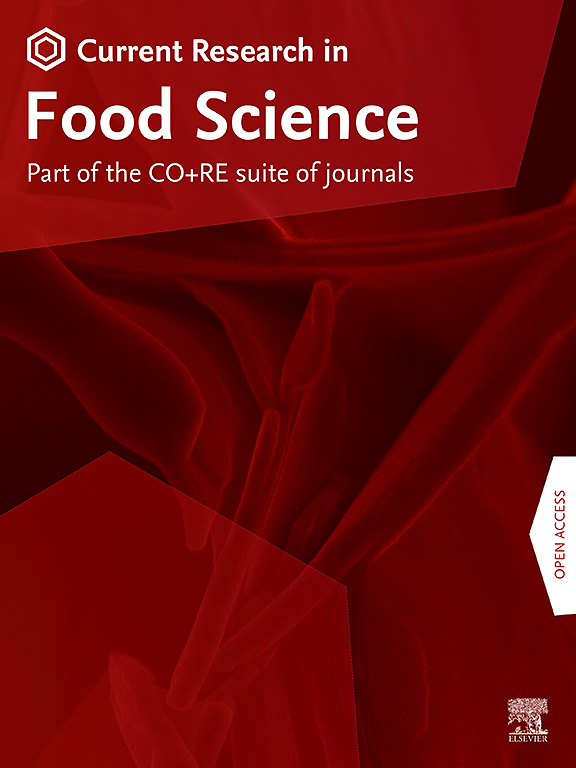Soymilk yogurt prepared using Pediococcus pentosaceus TOKAI 759m ameliorates cognitive function through gut microbiota modulation in high-fat diet mice
IF 6.2
2区 农林科学
Q1 FOOD SCIENCE & TECHNOLOGY
引用次数: 0
Abstract
Recent studies have confirmed that obesity leads to neuroinflammation and cognitive decline. This study aimed to examine whether soymilk yogurt prepared using Pediococcus pentosaceus TOKAI 759m could prevent cognitive decline and neuroinflammation progression in mice fed a high-fat diet (HFD). C57BL/6NJcl male mice were grouped according to the following dietary interventions and monitored for 15 weeks: (1) normal control diet, (2) HFD, (3) HFD with soymilk (SM), (4) HFD with soymilk yogurt (SY), and (5) HFD with bacterial cells of the starter strain (BC). The levels of inflammatory cytokines in serum and hippocampus were measured. Compared to the HFD group, the SY group scored higher in the novel object recognition test and exhibited lower levels of Interleukin-6 (IL-6) and Tumor Necrosis Factor (TNF)-α in the hippocampus. However, the SM and BC groups did not show these significant changes. Proteomic analysis of the hippocampus revealed three enriched protein clusters in the SY group: synaptic proteins, glycolysis, and mitochondrial ATP formation. Fecal samples were also collected to measure the proportion of gut microbiota using 16S rRNA analysis. Interestingly, the proportion of butyrate-producing bacteria, such as Clostridium and Akkermansia, tended to be higher in the SY group than in the HFD group. An additional in vitro study revealed that the components of SY, such as daidzein, genistein, and adenine, could decrease inflammatory cytokine levels in microglial cells. In conclusion, soymilk yogurt prepared using P. pentosaceus TOKAI 759m may modulate gut microbiota and prevent neuroinflammation, thereby leading to a possible improvement in cognitive function.

用戊糖Pediococcus TOKAI 759m制备的豆浆酸奶通过调节肠道微生物群改善高脂饮食小鼠的认知功能
最近的研究证实,肥胖会导致神经炎症和认知能力下降。本研究旨在研究用戊糖Pediococcus TOKAI 75.9制备的豆浆酸奶是否能预防高脂肪饮食(HFD)小鼠的认知能力下降和神经炎症进展。将C57BL/6NJcl雄性小鼠按以下饮食干预进行分组,监测15周:(1)正常对照饮食,(2)HFD, (3) HFD加豆浆(SM), (4) HFD加豆浆酸奶(SY), (5) HFD加发酵剂细菌细胞(BC)。测定血清和海马中炎性细胞因子水平。与HFD组相比,SY组在新物体识别测试中得分更高,海马中白细胞介素-6 (IL-6)和肿瘤坏死因子(TNF)-α水平较低。然而,SM和BC组没有表现出这些显著的变化。海马的蛋白质组学分析显示,SY组有三个富集的蛋白簇:突触蛋白、糖酵解和线粒体ATP形成。收集粪便样本,采用16S rRNA分析测定肠道微生物群的比例。有趣的是,产丁酸菌(如Clostridium和Akkermansia)的比例在SY组往往高于HFD组。另一项体外研究显示,SY的成分,如大豆苷元、染料木素和腺嘌呤,可以降低小胶质细胞中的炎症细胞因子水平。综上所述,P. pentosaceus TOKAI 75.9制备的豆浆酸奶可以调节肠道微生物群,预防神经炎症,从而可能改善认知功能。
本文章由计算机程序翻译,如有差异,请以英文原文为准。
求助全文
约1分钟内获得全文
求助全文
来源期刊

Current Research in Food Science
Agricultural and Biological Sciences-Food Science
CiteScore
7.40
自引率
3.20%
发文量
232
审稿时长
84 days
期刊介绍:
Current Research in Food Science is an international peer-reviewed journal dedicated to advancing the breadth of knowledge in the field of food science. It serves as a platform for publishing original research articles and short communications that encompass a wide array of topics, including food chemistry, physics, microbiology, nutrition, nutraceuticals, process and package engineering, materials science, food sustainability, and food security. By covering these diverse areas, the journal aims to provide a comprehensive source of the latest scientific findings and technological advancements that are shaping the future of the food industry. The journal's scope is designed to address the multidisciplinary nature of food science, reflecting its commitment to promoting innovation and ensuring the safety and quality of the food supply.
 求助内容:
求助内容: 应助结果提醒方式:
应助结果提醒方式:


